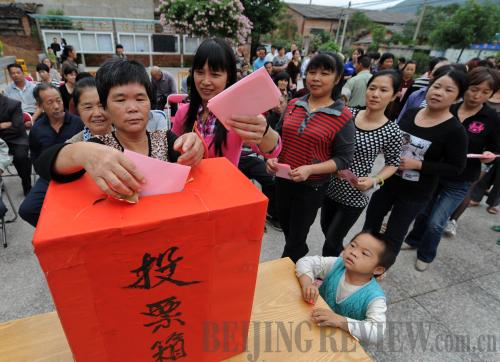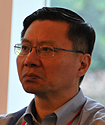|
 |
|
VOTING: Villagers of Minqing County, southeastern China's Fujian Province, submit paper evaluations rating the performance of local village officials into a ballot box on November 7, 2011 (ZHANG GUOJUN) |
 |
|
The author is a professor with Fudan University and senior researcher with the Center for Asian Studies of Geneva University |
China boasts a large population, a vast land, a long history and a rich cultural heritage. As a result, it has unique political institutions. Every government in Chinese history has tried to cope with disasters and special challenges of an expanding population and territory in order to maintain the legitimacy of their rules. During this long history, the Chinese people have formed a distinctive political ideology. The Chinese are far-sighted and attach more importance to the whole rather than to the individual parts. They place political stability and prosperity at an important position. The prosperous dynasties of the past were all governed by strong and open-minded governments.
It is superficial to recognize only the legitimacy of governments elected by multi-party election. Chinese parties today differ from Western parties. The Chinese ruling party inherits the ruling methods of the Confucian ruling group in traditional China. It is not elected by a multi-party election system. If China pursues multi-party competition, opposing political groups will be involved in fierce competitions and the nation will fall apart. China's political situation was out of control after the 1911 revolution and the country fell into chaos as a result of multi-party competition.
Looking back on human history, most governments are legitimate because they are historically legitimate. The Chinese Governments are historically legitimate because they have always selected the most talented people to govern and reflected the popular will. This is why China has taken the lead in the world throughout thousands of years of history. The historical legitimacy of Chinese governments reflects the political wisdom of the Chinese people and forms the core competitiveness of the Chinese political system.
The Chinese political institution is also unique for its incorporation of various political rules and regulations. For example, China has adopted such political systems as the feudatory system and the system of prefectures and counties in its history, while today's China pursues the policy of "one country, two systems" and the regional autonomy system. Now the Chinese mainland has formed closer economic and trade ties with Hong Kong and Macao and have signed many economic cooperation contracts with Taiwan. In the process of its reform and opening up, China has allowed some areas to attain wealth first and then help other areas to develop. This development method has generated good effects, yet it has seldom been applied by other countries.
In Chinese politics, the country is viewed as a whole. When one area suffers from a disaster, for instance, people from other areas will come to the rescue. China appears to be a centralized country, but in practice every reform is carried out according to local characteristics. Different places compete with each other and complement each other. For example, Shanghai, and Jiangsu and Zhejiang provinces adopt very different development models: The three elements of a modern market economy—government, market and society—function differently in the three provinces and result in different economic structures. In fact, areas of the whole country compete and cooperate with each other and combine to create China's miracle.
In short, China has learned from the West in establishing a powerful modern political system, but it also possesses a unique political culture. The combination of the two enables us to overcome populism, short-term thinking and legalism caused by Western democratic systems. As time goes by, I believe the whole world will recognize the positive influence of China's political wisdom on the future of humankind.
Email us at: zanjifang@bjreview.com |
